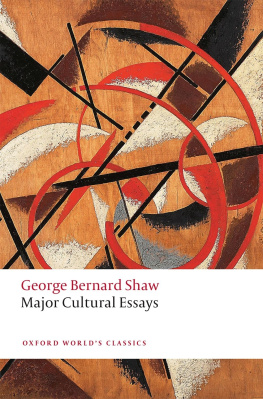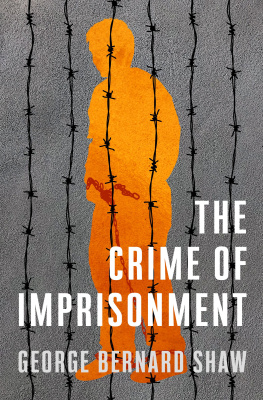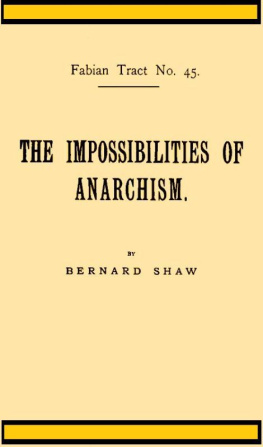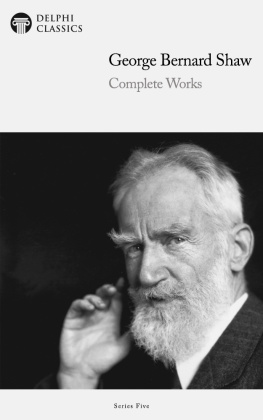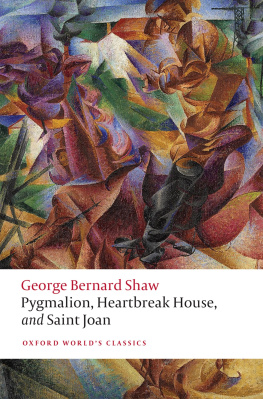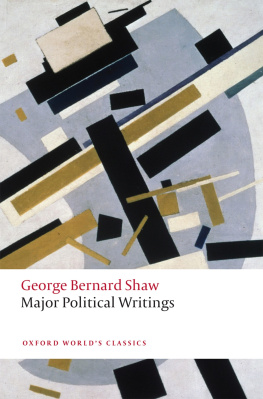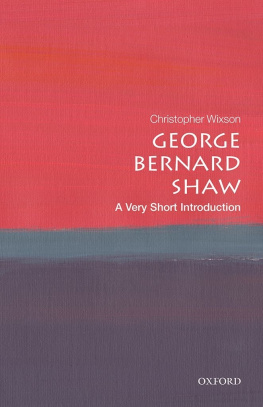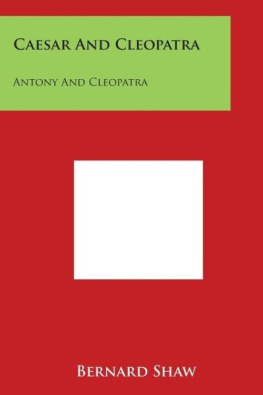GEORGE BERNARD KORNHABER DAVID SHAW - MAJOR CULTURAL ESSAYS.
Here you can read online GEORGE BERNARD KORNHABER DAVID SHAW - MAJOR CULTURAL ESSAYS. full text of the book (entire story) in english for free. Download pdf and epub, get meaning, cover and reviews about this ebook. year: 2021, genre: Detective and thriller. Description of the work, (preface) as well as reviews are available. Best literature library LitArk.com created for fans of good reading and offers a wide selection of genres:
Romance novel
Science fiction
Adventure
Detective
Science
History
Home and family
Prose
Art
Politics
Computer
Non-fiction
Religion
Business
Children
Humor
Choose a favorite category and find really read worthwhile books. Enjoy immersion in the world of imagination, feel the emotions of the characters or learn something new for yourself, make an fascinating discovery.
- Book:MAJOR CULTURAL ESSAYS.
- Author:
- Genre:
- Year:2021
- Rating:5 / 5
- Favourites:Add to favourites
- Your mark:
- 100
- 1
- 2
- 3
- 4
- 5
MAJOR CULTURAL ESSAYS.: summary, description and annotation
We offer to read an annotation, description, summary or preface (depends on what the author of the book "MAJOR CULTURAL ESSAYS." wrote himself). If you haven't found the necessary information about the book — write in the comments, we will try to find it.
MAJOR CULTURAL ESSAYS. — read online for free the complete book (whole text) full work
Below is the text of the book, divided by pages. System saving the place of the last page read, allows you to conveniently read the book "MAJOR CULTURAL ESSAYS." online for free, without having to search again every time where you left off. Put a bookmark, and you can go to the page where you finished reading at any time.
Font size:
Interval:
Bookmark:

General Editor: BRAD KENT
George Bernard Shaw was born in Dublin in 1856 into a family of Irelands well-established Protestant Ascendancy. His fathers alcoholism and business ineptitude caused the familys fortunes to decline, and Shaw left school at 15 to work as a clerk in a land agents office. In 1876, he moved to London, where he attended public lectures, joined political and cultural organizations, and, on most days, furthered his learning in the Reading Room of the British Museum. In 1884, he became a member of the newly founded Fabian Society, which was devoted to political reform along socialist principles, and remained one of their leading pamphleteers and campaigners for much of his life. Starting in the mid-1880s, Shaw worked variously as a book, music, art, and theatre reviewer, and this cultural criticism formed the basis of his important studies The Quintessence of Ibsenism (1891) and The Perfect Wagnerite (1898). He began playwrighting in earnest with Widowers Houses (1892), but his early plays were largely unperformed as they did not conform with the commercial theatres demands for musicals, farces, and melodramas. Shaw finally found success in New York in 1898 with The Devils Disciple (1897). With the windfall from the production, he retired from journalism and married Irish heiress Charlotte Payne-Townshend. In the new century, Shaw embarked on forging a theatre of the future, transforming the problem and discussion play into a theatre of ideas with Man and Superman (1903), John Bulls Other Island (1904), and Major Barbara (1905). The popular writer of Fannys First Play (1911) and Pygmalion (1912) became a pariah following his condemnation of jingoistic patriotism at the outset of the First World War. His comeback was slow but he achieved worldwide acclaim as the writer of Saint Joan (1923) and was awarded the 1925 Nobel Prize for Literature. He continued to write plays, including The Apple Cart (1928) and Geneva (1936), but his output dropped off significantly in the 1940s. Shaw died at his home in Ayot St Lawrence in 1950.
David Kornhaber is Associate Professor of English and Comparative Literature at the University of Texas at Austin. He is the author of Theatre & Knowledge (Palgrave, 2019) and The Birth of Theater from the Spirit of Philosophy: Nietzsche and the Modern Drama (Northwestern University Press, 2016), and he is, with Lawrence Switzky, the editor of the journal Modern Drama.
For over 100 years Oxford Worlds Classics have brought readers closer to the worlds great literature. Now with over 700 titles from the 4,000-year-old myths of Mesopotamia to the twentieth centurys greatest novels the series makes available lesser-known as well as celebrated writing.
The pocket-sized hardbacks of the early years contained introductions by Virginia Woolf, T. S. Eliot, Graham Greene, and other literary figures which enriched the experience of reading. Today the series is recognized for its fine scholarship and reliability in texts that span world literature, drama and poetry, religion, philosophy and politics. Each edition includes perceptive commentary and essential background information to meet the changing needs of readers.

Great Clarendon Street, Oxford, ox 2 6 dp , United Kingdom
Oxford University Press is a department of the University of Oxford. It furthers the Universitys objective of excellence in research, scholarship, and education by publishing worldwide. Oxford is a registered trade mark of Oxford University Press in the UK and in certain other countries
Editorial material David Kornhaber 2021
Chronology Brad Kent 2021
The moral rights of the authors have been asserted
First published as an Oxford Worlds Classics paperback 2021
Impression: 1
All rights reserved. No part of this publication may be reproduced, stored in a retrieval system, or transmitted, in any form or by any means, without the prior permission in writing of Oxford University Press, or as expressly permitted by law, by licence or under terms agreed with the appropriate reprographics rights organization. Enquiries concerning reproduction outside the scope of the above should be sent to the Rights Department, Oxford University Press, at the address above
You must not circulate this work in any other form and you must impose this same condition on any acquirer
British Library Cataloguing in Publication Data
Data available
ISBN 9780198817727
ebook ISBN 9780192549952
Printed and bound in Great Britain by
Clays Ltd, Elcograf S.p.A.
Links to third party websites are provided by Oxford in good faith and for information only. Oxford disclaims any responsibility for the materials contained in any third party website referenced in this work.
All unpublished quotations in this volume are used by the kind permission of The Society of Authors, on behalf of the Bernard Shaw Estate.
Had George Bernard Shaw never written a single play, he would still be remembered as a pivotal figure of the late nineteenth-century British stage, and of turn-of-the-century culture more generally, due to the impact of his voluminous criticism. Before he was Bernard Shaw, dramatist, he was Bernard Shaw, drama critic. And before that, music critic. And before that still, art critic. In one sense, Shaw left behind these appointments relatively early in his career. His last day as a drama critic was on 21 May 1898 more than fifty-one years before the premiere of his last completed play, Shakes versus Shav, in August 1949. In another sense, he never left behind these early roles at all. Forty-nine years after departing from his perch at the Saturday Review, the prominent London weekly, Shaw, age 92, would reflect on the importance of that early journalistic work to the trajectory of his career: It was this equipment that saved me from being starved out of literature... as a critic I came to the top irresistibly (p. 364).
The critics eye would always remain with him. These years of criticism, he later observed, advanced my mental education by compelling me to deliver carefully considered judgments, and to discriminate between the brilliant talents... and the genius that is not for an age but for all time (p. 365). And so too would the journalistic impulse remain, the intellectual pugilists need to hash out ideas in print as he had so frequently done in the rowdy world of London newspaper publishing in the 1890s. One of Shaws very last pieces of writing would be an article in the New Statesman and Nation defending his plays against an attack by Terence Rattigan, published in the same paper two months earlier. That article, titled simply The Play of Ideas and published in May 1950, appeared just months before Shaw passed away in November. It was as vibrant and combative as ever. The difference between [Rattigans] practice and mine, he writes, is that I reason out every sentence I write to the utmost of my capacity before I commit it to print, whereas he slams down everything that comes into his head without reasoning about it at all (p. 367). He was a drama critic still.
Cultural criticism was Shaws entry point into the life of letters he so desperately sought as a young man. Moving to London at the age of 19, following his mother who had relocated there from Dublin, Shaw originally thought he might be a novelist. When not working in the London offices of the Edison Telephone Company, he took a desk at the reading room of the British Museum the precursor to the British Library and the same locale where Karl Marx had written
Font size:
Interval:
Bookmark:
Similar books «MAJOR CULTURAL ESSAYS.»
Look at similar books to MAJOR CULTURAL ESSAYS.. We have selected literature similar in name and meaning in the hope of providing readers with more options to find new, interesting, not yet read works.
Discussion, reviews of the book MAJOR CULTURAL ESSAYS. and just readers' own opinions. Leave your comments, write what you think about the work, its meaning or the main characters. Specify what exactly you liked and what you didn't like, and why you think so.

